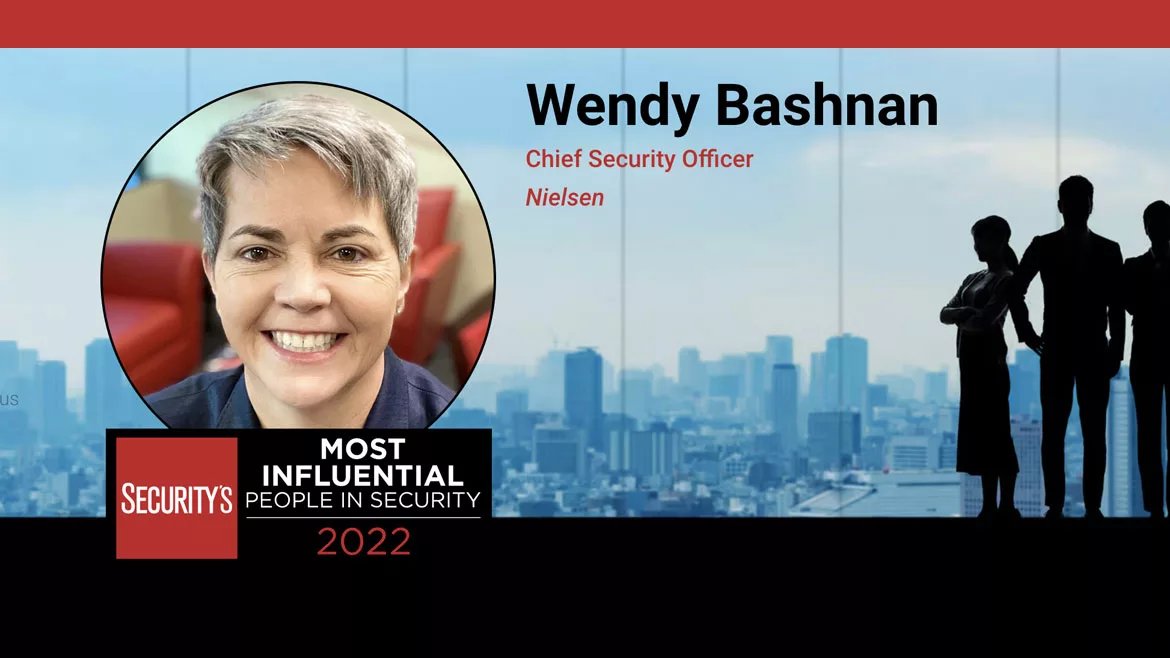Special Report
Wendy Bashnan — Most Influential People in Security 2022
Chief Security Officer, Nielsen

Bio Image courtesy of Bashnan
Background image courtesy of metamorworks / iStock / Getty Images Plus / Courtesy of Getty Images
Wendy Bashnan has never worked a day in her life. Well, that’s what she will tell you, though the reality is that she’s worked incredibly hard as a security leader within both the public and private sectors over the past three decades.
Bashnan, currently Chief Security Officer (CSO) at Nielsen, is a security leader that wants to do things differently. She doesn’t believe in the “it has always been done approach.” She believes in pushing the boundaries and taking lessons learned from other industries, departments and sectors — and translating those lessons into the physical (or what she calls the “people”) side of security.
“I like to see what other industries do and steal really good ideas,” she laughs. “Human resources, IT, cybersecurity… all of these industries are doing great things. For example, cybersecurity has always been really good at awareness — why can’t people security do that?”
One of the biggest lessons learned that she believes is instrumental to her career success thus far is the power of communication, and it’s a lesson Bashnan originally learned from the sportscasting industry. “I think I connected the dots over time by growing up with my father as a sportscaster. I was exposed to the idea of marketing yourself and communicating in such a way that will engage and appeal to people, and I do think that translates to security,” Bashnan says. “As security leaders, you have to engage your audience and be able to articulate your position and create buy-in because the utopia for security people is a place where we are a part of the conversation, and not only do we engage people, but people engage us early and often.”
Bashnan has polished her communication skills over the course of her career — more than 28 years of which were spent in public service. She was drawn to the Diplomatic Security Service (DSS) in the U.S. State Department because of her desire to help others and her passion for travel. “To be able to combine two things that I loved together — I just consider myself very fortunate,” she reflects. “I know there are some people that struggle to get up and go to work in the morning, and I’ve never had that feeling.”
Throughout her career in public service, Bashnan received numerous honors and meritorious awards. She’s held many positions, including Special Agent in Charge of the New York Field Office and Miami Field Office, Deputy Olympic Security Coordinator overseeing the U.S. interests in the 2008 Beijing Summer Olympics, and Chief of Staff to the Assistant Secretary for the Bureau of Diplomatic Security.
Later in her career, Bashnan was appointed Director of the NATO Office of Security, where she led international efforts to assess and mitigate security risks for NATO missions worldwide. Bashnan’s final role within DSS before retiring was Deputy Assistant Secretary and Assistant Director to the Training Directorate, a multi-agency collaborative effort responsible for hard skills and counterterrorism threat training for the State Department, Foreign Service and personnel working and living overseas. During her tenure overseeing training, the COVID-19 pandemic hit and the department needed to pivot, continuing to operate while providing safe and secure training.
“It was a challenging and exciting time, and we certainly experimented a lot. We paused here and there, but we never stopped, and I consider that a win,” she says. Bringing ideas to the table is something Bashnan believes is imperative to the future of security, continuity and resiliency, and it’s something she preaches to the professionals she coaches and mentors.
“I really believe in having a growth mindset. You’re never done learning, and you want to surround yourself with people that have different backgrounds, beliefs and ideas because that pushes you further,” she says. “In life and in security, it’s important to gain perspectives different than your own.”
The idea of adaptability and willingness to try new things goes hand in hand with resiliency and proactive mitigation, both of which Bashnan is extremely passionate about — not only within her own organization, but within the security industry as whole.
“Security is looked at as a cost center within the corporate structure, but if you can do business resiliency the right way, you can truly change the culture of the company and that will shift security to be the growth center within an organization. That, to me, is top of mind for all security professionals today and it’s an opportunity for us to make a significant cultural shift within the business model,” she says.
Looking for a reprint of this article?
From high-res PDFs to custom plaques, order your copy today!







